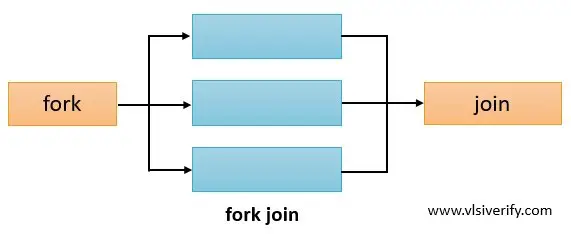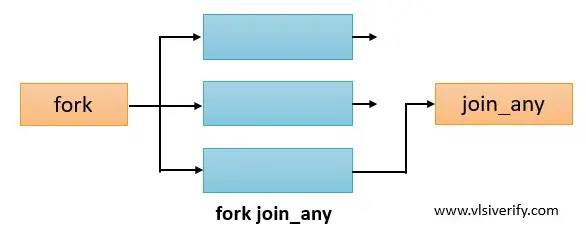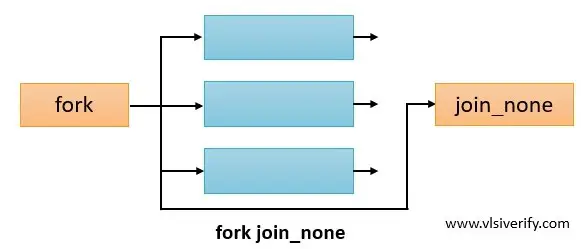SystemVerilog Processes
The process or thread is a common concept of an operating system. In an operating system (OS), a process is a program (a piece of code) that is under execution.
Similarly in SystemVerilog, process or thread is also a piece of code that executes independently. The process or thread is enclosed in begin..end. If begin..end is not used, each statement acts as a separate process.
SystemVerilog provides three different ways to start/control processes.
SystemVerilog fork join
In fork-join, all processes start simultaneously, and join will wait for all processes to be completed.

Example of fork join
In the below example, there are three processes A, B, and C. All started at the same time.
Execution time for process A: 10ns
Execution time for process B: 15ns
Execution time for process C: 20ns
Fork-join will be completed when all three process execution is completed.
module fork_join_example;
initial begin
fork
begin // process A
$display("Process A started at time = %0t", $time);
#10;
$display("Process A completed at time = %0t", $time);
end
begin // process B
$display("Process B started at time = %0t", $time);
#15;
$display("Process B completed at time = %0t", $time);
end
begin // process C
$display("Process C started at time = %0t", $time);
#20;
$display("Process C completed at time = %0t", $time);
end
join
$display("fork-join completed at time = %0t", $time);
end
endmoduleOutput:
Process A started at time = 0
Process B started at time = 0
Process C started at time = 0
Process A completed at time = 10
Process B completed at time = 15
Process C completed at time = 20
fork-join completed at time = 20SystemVerilog fork join_any
In fork-join_any, all processes start simultaneously and join_any will wait for any one process to be completed.

Example of fork join_any
In the below example, there are three processes A, B, and C. All started at the same time.
Execution time for process A: 10ns
Execution time for process B: 15ns
Execution time for process C: 20ns
Fork-join_any will be completed when any one of the three process execution is completed.
module fork_join_any_example;
initial begin
fork
begin // process A
$display("Process A started at time = %0t", $time);
#10;
$display("Process A completed at time = %0t", $time);
end
begin // process B
$display("Process B started at time = %0t", $time);
#15;
$display("Process B completed at time = %0t", $time);
end
begin // process C
$display("Process C started at time = %0t", $time);
#20;
$display("Process C completed at time = %0t", $time);
end
join_any
$display("fork-join_any completed at time = %0t", $time);
end
endmoduleOutput:
Process A started at time = 0
Process B started at time = 0
Process C started at time = 0
Process A completed at time = 10
fork-join_any completed at time = 10
Process B completed at time = 15
Process C completed at time = 20SystemVerilog fork join_none
In fork-join_none, all processes start simultaneously and join_none will not wait for any process to be completed.
So, we can say that fork-join and fork-join_any is blocked due to process execution time, whereas fork-join_none is not blocked due to any process.

Example of fork join_none
In the below example, there are three processes A, B, and C. All started at the same time.
Execution time for process A: 10ns
Execution time for process B: 15ns
Execution time for process C: 20ns
Fork-join_none will be completed without waiting for any process completion.
module fork_join_none_example;
initial begin
fork
begin // process A
$display("Process A started at time = %0t", $time);
#10;
$display("Process A completed at time = %0t", $time);
end
begin // process B
$display("Process B started at time = %0t", $time);
#15;
$display("Process B completed at time = %0t", $time);
end
begin // process C
$display("Process C started at time = %0t", $time);
#20;
$display("Process C completed at time = %0t", $time);
end
join_none
$display("fork-join_none completed at time = %0t", $time);
end
endmoduleOutput:
fork-join_none completed at time = 0
Process A started at time = 0
Process B started at time = 0
Process C started at time = 0
Process A completed at time = 10
Process B completed at time = 15
Process C completed at time = 20disable fork
The ‘disable fork’ statement terminates all outstanding or active processes.
Without disable fork
In the below example, fork-join_any is used without a wait fork statement. So, once process A is finished, immediately join_any is unblocked without waiting for process B and C to be completed and further statements are executed.
module fork_join_any_example;
initial begin
fork
begin // process A
$display("Process A started at time = %0t", $time);
#10;
$display("Process A completed at time = %0t", $time);
end
begin // process B
$display("Process B started at time = %0t", $time);
#15;
$display("Process B completed at time = %0t", $time);
end
begin // process C
$display("Process C started at time = %0t", $time);
#20;
$display("Process C completed at time = %0t", $time);
end
join_any
$display("fork-join_any completed at time = %0t", $time);
end
endmoduleOutput:
Process A started at time = 0
Process B started at time = 0
Process C started at time = 0
Process A completed at time = 10
fork-join_any completed at time = 10
Process B completed at time = 15
Process C completed at time = 20With disable fork
After the addition of the ‘disable fork’ statement, processes B and C will get terminated immediately.
module disable_fork_example;
initial begin
fork
begin // process A
$display("Process A started at time = %0t", $time);
#10;
$display("Process A completed at time = %0t", $time);
end
begin // process B
$display("Process B started at time = %0t", $time);
#15;
$display("Process B completed at time = %0t", $time);
end
begin // process C
$display("Process C started at time = %0t", $time);
#20;
$display("Process C completed at time = %0t", $time);
end
join_any
disable fork;
$display("fork-join_any completed at time = %0t", $time);
end
endmoduleOutput:
Process A started at time = 0
Process B started at time = 0
Process C started at time = 0
Process A completed at time = 10
fork-join_any completed at time = 10wait fork
The ‘wait fork’ statement is used to wait for all forked processes to be completed.
Without wait fork
In the below example, fork-join_any is used without a wait fork statement. So, once process A is finished, immediately join_any is unblocked without waiting for process B and C to be completed and further statements are executed.
module fork_join_any_example;
initial begin
fork
begin // process A
$display("Process A started at time = %0t", $time);
#10;
$display("Process A completed at time = %0t", $time);
end
begin // process B
$display("Process B started at time = %0t", $time);
#15;
$display("Process B completed at time = %0t", $time);
end
begin // process C
$display("Process C started at time = %0t", $time);
#20;
$display("Process C completed at time = %0t", $time);
end
join_any
$display("fork-join_any completed at time = %0t", $time);
end
endmoduleOutput:
Process A started at time = 0
Process B started at time = 0
Process C started at time = 0
Process A completed at time = 10
fork-join_any completed at time = 10
Process B completed at time = 15
Process C completed at time = 20With wait fork
After the addition of the wait fork statement, statements after the ‘wait fork’ will be executed only after all forked process completion.
module wait_fork_example;
initial begin
fork
begin // process A
$display("Process A started at time = %0t", $time);
#10;
$display("Process A completed at time = %0t", $time);
end
begin // process B
$display("Process B started at time = %0t", $time);
#15;
$display("Process B completed at time = %0t", $time);
end
begin // process C
$display("Process C started at time = %0t", $time);
#20;
$display("Process C completed at time = %0t", $time);
end
join_any
wait fork;
$display("fork-join_any completed at time = %0t", $time);
end
endmoduleOutput:
Process A started at time = 0
Process B started at time = 0
Process C started at time = 0
Process A completed at time = 10
Process B completed at time = 15
Process C completed at time = 20
fork-join_any completed at time = 20System Verilog Tutorials